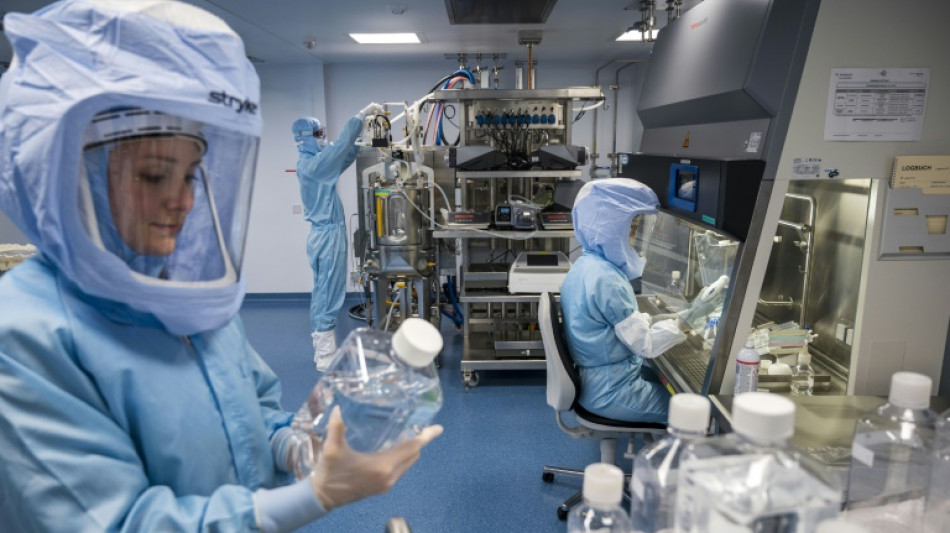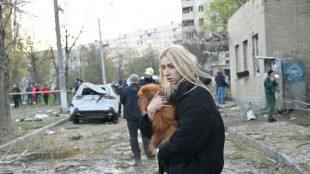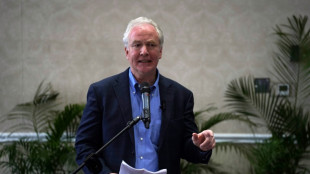
-
 SFWJ / Medcana Announces Strategic Expansion Into Australia With Acquisition of Cannabis Import and Distribution Licenses
SFWJ / Medcana Announces Strategic Expansion Into Australia With Acquisition of Cannabis Import and Distribution Licenses
-
Arsenal's Havertz could return for Champions League final

-
 US officials split on Ukraine truce prospects
US officials split on Ukraine truce prospects
-
Client brain-dead after Paris cryotherapy session goes wrong

-
 Flick demands answers from La Liga for 'joke' schedule
Flick demands answers from La Liga for 'joke' schedule
-
'Maddest game' sums up Man Utd career for Maguire

-
 Trial opens for students, journalists over Istanbul protests
Trial opens for students, journalists over Istanbul protests
-
Gaza rescuers say Israeli strikes kill 24 after Hamas rejects truce proposal

-
 'Really stuck': Ukraine's EU accession drive stumbles
'Really stuck': Ukraine's EU accession drive stumbles
-
'Not the time to discuss future', says Alonso amid Real Madrid links

-
 74 killed in deadliest US attack on Yemen, Huthis say
74 killed in deadliest US attack on Yemen, Huthis say
-
Southgate's ex-assistant Holland fired by Japan's Yokohama

-
 Vance meets Meloni in Rome before Easter at the Vatican
Vance meets Meloni in Rome before Easter at the Vatican
-
Ryan Gosling to star in new 'Star Wars' film

-
 Hamas calls for pressure to end Israel's aid block on Gaza
Hamas calls for pressure to end Israel's aid block on Gaza
-
Russia says Ukraine energy truce over, US mulls peace talks exit

-
 58 killed in deadliest US strike on Yemen, Huthis say
58 killed in deadliest US strike on Yemen, Huthis say
-
Museums rethink how the Holocaust should be shown

-
 Three dead after deadly spring storm wreaks havoc in the Alps
Three dead after deadly spring storm wreaks havoc in the Alps
-
No need for big changes at Liverpool, says Slot

-
 Bloody Philippine passion play sees final performance of veteran 'Jesus'
Bloody Philippine passion play sees final performance of veteran 'Jesus'
-
New US envoy prays, delivers Trump 'peace' message at Western Wall

-
 Postecoglou sticking around 'a little longer' as Spurs show fight in Frankfurt
Postecoglou sticking around 'a little longer' as Spurs show fight in Frankfurt
-
US threatens to withdraw from Ukraine talks if no progress

-
 Tears and defiance in Sumy as Russia batters Ukraine border city
Tears and defiance in Sumy as Russia batters Ukraine border city
-
Russia rains missiles on Ukraine as US mulls ending truce efforts

-
 Tokyo leads gains in most Asian markets on trade deal hopes
Tokyo leads gains in most Asian markets on trade deal hopes
-
Two missing after deadly spring snowstorm wreaks havoc in the Alps

-
 'War has taken everything': AFP reporter returns home to Khartoum
'War has taken everything': AFP reporter returns home to Khartoum
-
US strikes on Yemen fuel port kill 38, Huthis say

-
 Slegers targets Lyon scalp in pursuit of Arsenal European glory
Slegers targets Lyon scalp in pursuit of Arsenal European glory
-
'Defend ourselves': Refugee girls in Kenya find strength in taekwondo

-
 China's manufacturing backbone feels Trump trade war pinch
China's manufacturing backbone feels Trump trade war pinch
-
Sri Lankans throng to Kandy for rare display of Buddhist relic

-
 Chinese vent anger at Trump's trade war with memes, mockery
Chinese vent anger at Trump's trade war with memes, mockery
-
Heartbroken Brits abandon pets as living costs bite

-
 Mongolian LGBTQ youth fight for recognition through music, comedy
Mongolian LGBTQ youth fight for recognition through music, comedy
-
Cash crunch leaves Syrians queueing for hours to collect salaries

-
 Lyon left to regroup for Champions League bid after painful European exit
Lyon left to regroup for Champions League bid after painful European exit
-
Unravelling Real Madrid face Athletic Bilbao Liga test

-
 Napoli disturbing buoyant Inter's peace in Serie A Easter bonanza
Napoli disturbing buoyant Inter's peace in Serie A Easter bonanza
-
Disappointed Dortmund chase consistency with Europe at stake

-
 Asian markets mixed as traders track tariff talks
Asian markets mixed as traders track tariff talks
-
Yan and Buhai share lead at LA Championship

-
 Under fire at debate, Canada PM Carney tries to focus on Trump
Under fire at debate, Canada PM Carney tries to focus on Trump
-
Liverpool poised for Premier League coronation, Leicester, Ipswich for relegation

-
 India's elephant warning system tackles deadly conflict
India's elephant warning system tackles deadly conflict
-
US senator meets wrongfully deported Salvadoran migrant

-
 Gustavo Dudamel: the superstar conductor building bridges to pop
Gustavo Dudamel: the superstar conductor building bridges to pop
-
Japan rice prices soar as core inflation accelerates


WHO pandemic agreement talks face deadline crunch
The outcome of years-long negotiations on a global agreement on tackling future pandemics remained in doubt ahead of a final deadline Friday.
Five years after Covid-19 killed millions -- and with new health threats lurking, from H5N1 bird flu to measles, mpox and Ebola -- pressure is mounting for a landmark deal on pandemic prevention, preparedness and response.
"Having a framework that brings nations together and plans for the next pandemic will save thousands if not millions of lives," insisted WHO emergencies director Michael Ryan.
But President Donald Trump's decision to withdraw the United States from the World Health Organization and his large-scale dismantling of US health institutes is a new threat to the global health risk surveillance system, experts warn.
"It's now or never," said Sueri Moon, co-director of the Global Health Centre at the Geneva Graduate Institute.
In December 2021, WHO member states resolved to seek a deal aimed at preventing and preparing for future pandemics, to avoid the mistakes made during Covid.
Major disputes have slowed negotiations, including on how to share data on dangerous pathogens, and whether the transfer of the technology and know-how to produce vaccines, tests and treatments should be mandatory or voluntary.
- 'Unpredictable' -
After 13 rounds of discussions, countries have been meeting at the WHO headquarters in Geneva for final negotiations this week, with a Friday night deadline to iron out remaining problems.
The aim is to have a text ready for final approval during the WHO's annual assembly next month.
"The member states are working very hard," WHO chief Tedros Adhanom Ghebreyesus told reporters on Thursday, adding: "I hope they will reach a deal."
Ryan added that the negotiators were "making steady progress. But there are difficult issues on the table."
The number of disputed issues have steadily shrunk in recent months, with observers saying the main sticking point now is "political will".
The outcome is "unpredictable", a diplomatic source told AFP.
"Substantial progress" has been made on the draft text, "but differences remain on some key articles", China's mission in Geneva told AFP, calling on all parties to "display mutual understanding" to secure an agreement that is "meaningful, equitable and actionable".
- 'Very important' -
A new extension of the talks until May is possible, with NGOs and experts urging countries to compromise.
"It's very important to reach this agreement, even with a sub-optimal text," said Ellen 't Hoen, director of the Medicines Law and Policy NGO.
"That is much more preferable than having to negotiate such an agreement from scratch, because that will likely only happen after the next pandemic hits, and that would be an unacceptable situation."
Among the remaining sticking points are a so-called Pathogen Access and Benefit-Sharing System (PABS) proposed in the text.
The proposal calls for participating companies to provide the WHO with "rapid access" to 20 percent of their production of pandemic-related health products, including "at least 10 percent of their real time production" in the form of donations.
Some countries, especially producer states, have meanwhile balked at what they consider high thresholds.
While the talks could in theory continue even after next month's assembly, there is widespread concern that if the process drags on, the political will to conclude a deal would dissipate.
If that happens, "it will probably be too late", Moon said.
"The wind will go out of the sails."
P.M.Smith--AMWN